SYDNEY // Australia's ruling Labor party voted yesterday to end a long-standing ban on exporting uranium to India following a passionate debate about nuclear weapons and reactor safety.
The party passed a proposal by the prime minister, Julia Gillard, with 206 votes to 185, reversing a decades-old policy excluding New Delhi from Australia's uranium trade because the nuclear-armed country is not a signatory to the Non-Proliferation Treaty.
Ms Gillard argued it was neither rational nor intellectually defensible to sell uranium to rising powers such as China but not India, the world's largest democracy and a fast-growing nation of increasing economic and diplomatic clout.
"Let's just face facts here, our refusal to sell uranium to India is not going to cause India to decide that it will no longer have nuclear weapons," Ms Gillard told the Labor summit. "We can honour the treaty, we can change our platform, we can, under the most stringent of agreements, sell uranium to India if we so choose and, delegates, I believe we should make that choice."
The foreign minister, Kevin Rudd, warned India would need to meet "onerous" conditions before trade could begin and said it would be "a very long, detailed and, I think, tough negotiation".
Although Australia does not use nuclear power, it is the world's third-ranking uranium producer behind Kazakhstan and Canada, exporting 9,600 tonnes of oxide concentrate each year worth more than 1.1 billion Australian dollars (Dh4 billion).
It also has the world's largest reserves of uranium - 23 per cent of the total - according to the World Nuclear Association.
Canberra ships the nuclear fuel to China, Japan, Taiwan and the US but has refused to sell to India - long a sticking point in usually cordial relations between the key trading partners.
The defence minister, Stephen Smith, backed the premier, saying India had voluntarily submitted to civilian nuclear checks by international regulators and was a "rising power ... which is deserving of being accorded that status".
New Delhi agreed to separate its civil and military nuclear facilities and abide by International Atomic Energy Agency safeguards under a 2005 agreement with the US.
The US-India deal ended a three-decade US moratorium on nuclear trade with India. It allowed US assistance to India's civilian nuclear energy programme and expanded US-India cooperation in energy and satellite technology.
India is expected to increase its use of nuclear power from 3 per cent of electricity generation to 40 per cent by 2050, and Australia's uranium lobby believes it could be selling 2,500 tonnes a year to the country by 2030.
Strong views were voiced against lifting the ban during the Labor debate. The British-born communications minister, Stephen Conroy, choked up with emotion as he described how the 1957 Windscale nuclear fire in Cumbria had affected his family.
Windscale was Britain's worst atomic accident, rated at five out of seven on the international scale, in which a blaze inside a reactor released substantial amounts of radioactive contaminants into the local area.
Parts of Australia's desert interior were left uninhabitable by British atomic tests carried out between 1955 and 1963 and one delegate said local people were "dying of cancers to this day".
Peter Garrett, the former frontman for the rock band Midnight Oil and a former Labor environment minister, received a standing ovation for his impassioned speech, as did the transport minister, Anthony Albanese, who criticised the move following Japan's Fukushima reactor disaster.
"Nine months after Fukushima we are being asked to sell more uranium for more nuclear reactors to a country that does not have nuclear safeguards," Mr Albanese said.
Anti-nuclear campaigners said the decision was a major blow to the global nuclear non-proliferation regime.
"The Labor Party has put profits before the peace and security of the region," said Tim Wright, the Australian director of the International Campaign to Abolish Nuclear Weapons.





